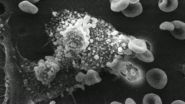(Press-News.org) DETROIT – A new study from researchers at Henry Ford Hospital in Detroit finds widespread vitamin D deficiency among patients who undergo a thyroidectomy, potentially putting them at greater risk for developing dangerously low blood calcium levels after surgery.
Among the patients in the Henry Ford study, 40 percent had low vitamin D levels prior to surgery. Those more likely to be vitamin D deficient are individuals older than age 50, African Americans, Hispanics and patients undergoing surgery for hyperthyroidism.
"The issue of vitamin D deficiency in patients who are undergoing thyroid surgery can potentially impact both the care of parathyroid glands during surgery and calcium management after surgery," says lead study author Hamad Chaudhary, M.D., with the Department of Otolaryngology-Head & Neck Surgery at Henry Ford.
"By routinely checking vitamin D levels in all patients scheduled for thyroid surgery or selectively testing those at great risk, we may be able to improve surgical outcomes and shorten hospital stays."
Study results were presented this week at the 2014 American Academy of Otolaryngology-Head and Neck Surgery (AAO-HNS) annual meeting in Orlando.
Thyroidectomy, the surgical removal of all or part of the thyroid gland, is most often recommended for thyroid cancer, goiter or hyperthyroidism (an over-active thyroid). Women are more likely to undergo thyroidectomy than men.
During the past decade, vitamin D deficiency has received a great deal of attention for the role it may play in chronic illnesses such as cardiovascular disease and cancer.
Hypocalcemia, low levels of calcium in the blood, is one of the primary complications that can arise after thyroidectomy. Depending on its duration, severity and onset, hypocalcemia can vary from an asymptomatic biochemical abnormality to a life-threatening disorder.
"Low vitamin D levels have now been shown to increase this risk, even in the setting of normal post-operative parathyroid hormone levels," notes study senior author Michael Singer, M.D., Director, Division of Thyroid & Parathyroid Surgery in the Department of Otolaryngology-Head & Neck Surgery at Henry Ford.
"Providing vitamin D supplementation to these patients prior to surgery is an easy and inexpensive step to make their surgery safer."
The Henry Ford study gathered data from 110 patients who underwent thyroidectomy at Henry Ford Hospital between January 2013 and December 2013. All patients were operated on by Dr. Singer.
Patients were included in the study if they were undergoing thyroid surgery for the first time in the surgeons' practice. Patients had surgery for both benign and malignant disease. Their levels of vitamin D, serum calcium, ionized calcium and parathyroid hormone levels were assessed prior to surgery.
Among the study participants, 40 percent were found to be vitamin D deficient, a finding consistent with reported overall prevalence of this problem in the U.S.
The patients who were found to have low levels of vitamin D were prescribed the vitamin D supplementation and completed the course prior to surgery.
INFORMATION:
Study: Widespread vitamin D deficiency in thyroidectomy patients
2014-09-25
ELSE PRESS RELEASES FROM THIS DATE:
How to make stronger, 'greener' cement
2014-09-25
CAMBRIDGE, Mass--Concrete is the world's most-used construction material, and a leading contributor to global warming, producing as much as one-tenth of industry-generated greenhouse-gas emissions. Now a new study suggests a way in which those emissions could be reduced by more than half — and the result would be a stronger, more durable material.
The findings come from the most detailed molecular analysis yet of the complex structure of concrete, which is a mixture of sand, gravel, water, and cement. Cement is made by cooking calcium-rich material, usually limestone, ...
BUSM researchers find NAS treatment needs standardization
2014-09-25
(Boston) – When it comes to treating infants with neonatal abstinence syndrome (NAS), researchers from Boston University School of Medicine (BUSM) believe the care for these infants should be consistent and objective, with standardized assessment tools and evidence to back up pharmacologic and nonpharmacologic treatment choices.
The review paper, which is published online in Addiction Science & Clinical Practice, highlights the need for more research in this field to optimize care for both infants and their mothers.
NAS is a collection of signs and symptoms infants ...
Fecal microbiota transplantation recommended for treatment of C. difficile
2014-09-25
(Vienna, October 26, 2014) The transplantation of faecal microbiota from a healthy donor has been shown in recent clinical studies to be a safe and highly effective treatment for recurrent Clostridium difficile (C. difficile) infection and is now recommended in European treatment guidelines.1,2 Faecal microbiota transplantation (FMT) has emerged as a revolutionary, potentially life-saving treatment for this common, difficult-to-treat infection, and is showing promise in the management of other microbiota-related conditions.3,4
Presenting at the 22nd United European Gastroenterology ...
In the face of uncertainty, the brain chooses randomness as the best strategy
2014-09-25
AUDIO:
Editor Karen Carniol interviews Dr. Alla Karpova on her latest Cell paper.
Click here for more information.
Past experience is usually a reliable guide for making decisions, but in unpredictable and challenging situations, it might make more sense to take risks. A study published by Cell Press September 25th in the journal Cell shows that, in competitive situations, rats abandon their normal tactic of using past experience to make decisions and instead make random choices ...
How the brain gains control over Tourette syndrome
2014-09-25
Tourette syndrome is a developmental disorder characterized by involuntary, repetitive, and stereotyped movements or utterances. Now researchers reporting in the Cell Press journal Current Biology on September 25 have new evidence to explain how those with Tourette syndrome in childhood often manage to gain control over those tics. In individuals with the condition, a portion of the brain involved in planning and executing movements shows an unusual increase compared to the average brain in the production of a primary inhibitory neurotransmitter known as GABA.
The paradoxical ...
Modified vitamin D shows promise as treatment for pancreatic cancer
2014-09-25
VIDEO:
Salk scientists find that a vitamin D-derivative makes tumors vulnerable to chemotherapy.
Click here for more information.
LA JOLLA—A synthetic derivative of vitamin D was found by Salk Institute researchers to collapse the barrier of cells shielding pancreatic tumors, making this seemingly impenetrable cancer much more susceptible to therapeutic drugs.
The discovery has led to human trials for pancreatic cancer, even in advance of its publication today in the journal ...
How physical exercise protects the brain from stress-induced depression
2014-09-25
Physical exercise has many beneficial effects on human health, including the protection from stress-induced depression. However, until now the mechanisms that mediate this protective effect have been unknown. In a new study in mice, researchers at Karolinska Institutet in Sweden show that exercise training induces changes in skeletal muscle that can purge the blood of a substance that accumulates during stress, and is harmful to the brain. The study is being published in the prestigious journal Cell.
"In neurobiological terms, we actually still don't know what depression ...
Brain chemical potential new hope in controlling Tourette Syndrome tics
2014-09-25
A chemical in the brain plays a vital role in controlling the involuntary movements and vocal tics associated with Tourette Syndrome (TS), a new study has shown.
The research by psychologists at The University of Nottingham, published in the latest edition of the journal Current Biology, could offer a potential new target for the development of more effective treatments to suppress these unwanted symptoms.
The study, led by PhD student Amelia Draper under the supervision of Professor Stephen Jackson, found that higher levels of a neurochemical called GABA in a part ...
Super enhancers in the inflamed endothelium
2014-09-25
Boston, MA – Normally, the lining of blood vessels, or endothelium, when at rest, acts like Teflon, ignoring the many cells and other factors rushing by in the bloodstream. In response to inflammatory signals, as well as other stimuli, endothelial cells change suddenly and dramatically—sending out beacons to attract inflammatory cells, changing their surface so those cells can stick and enter tissues, and initiating a complex cascade of responses essential to fighting infection and dealing with injury. Unfortunately, these same endothelial responses also promote atherosclerosis, ...
Novel compound prevents metastasis of multiple myeloma in mouse studies
2014-09-25
BOSTON –– In an advance against the problem of cancer metastasis, Dana-Farber Cancer Institute scientists have shown that a specially developed compound can impede multiple myeloma from spreading to the bones in mice. The findings, published in the Sept. 25 issue of Cell Reports, suggest the technique can protect human patients, as well, from one of the most deadly aspects of cancer.
The research involves a new approach to the challenge of cancer metastasis, the process by which tumors spread to and colonize distant parts of the body. Whereas research has traditionally ...


